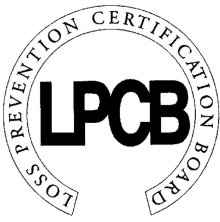Home »
Loss Prevention Certification Board
 BRE Certification (incorporating LPCB) is a sister company to BRE. BRE Certification is a wholly owned subsidiary of the BRE Trust, which is a registered research and education charity.
BRE Certification (incorporating LPCB) is a sister company to BRE. BRE Certification is a wholly owned subsidiary of the BRE Trust, which is a registered research and education charity.
As a world leading third party certification and approvals body BRE Certification are dedicated to approving fire, security, construction, and environmental, products and services worldwide. Their approvals are designed to help a wide range of sectors, including: construction, healthcare, insurance, offices, manufacturers, shops, schools, transport & infrastructure etc.
Approval (or certification as it is also known) is independent third party confirmation that a product, system or service meets and continues to meet a standard, where there are no published standards; products may be approved to our own specialised designed schedules.
BRE Certification approve products and services to many different standards including:
-
Their own Loss Prevention Standards (LPS)
-
British Standards (BS)
-
International (ISO)
-
European (EN)
-
Underwriters Laboratories (UL)
BRE Certification believes their marks stand for something special - they are true 'quality marks' and are recognised across the world.
BRE Certification is accredited by the United Kingdom Accreditation Service for most of their schemes and their accreditation covers product, personnel and quality management systems.
BRE Certification is a Notified Body under the Construction Products Directive (CPD), the Marine Equipment Directive (MED), the Pressure Equipment Directive (PED) and the Transportable Pressure Equipment Directive (TPED).
Choosing good quality products and services sends positive messages to influencers and stakeholders such as regulators, insurers, lenders, customers and suppliers. Their approvals offer a number of intangible benefits, such as compliance with legislation, market entry, differentiation and confidence etc. Choosing products and services, tested and approved against the appropriate standards is important and in the long run could save time and money.
For further information visit www.redbooklive.com
Understand just how their approvals process works and why it is so highly regarded. To ensure quality and to avoid misuse of standards, BRE Certification list all approved products, services and licensees in their Red Book, which is updated everyday.
With the most extensive fire testing laboratories in the world, a highly qualified team of expert scientists and engineers, BRE Certification are also uniquely placed to offer testing, research, specialist advice and a bespoke one stop shop service to a wide range of clients.
Security, doors, shutters & grilles
For a number of years LPCB has been working with Insurers, Government, Police and end users to develop a system of classifying the resistance of facade elements to forced entry. The result of this work is a standard that in today's environment is becoming a core element of specifications for new buildings and target hardening of existing sites.
The standard is LPS 1175 (Specification for testing and classifying the burglary resistance of building components, strongpoints and security enclosures).
Certification of the products listed in the Red Book is based on testing undertaken by our world renowned physical testing laboratory, assessments of the installation and maintenance instructions supplied with the products and audits of the manufacturer's quality control system. Together these enable LPCB to ensure that the product you select will offer the required level of security.
In addition to security doors, shutters and grilles, the standard also caters for the assessment and certification of any other product or system designed to prevent unauthorised access by mechanical means. These include:
-
cladding systems
-
fixed grilles
-
garage doors
-
sheds & tool stores
-
strongpoints & enclosures
-
vehicles
-
fences & walls
-
folding doorsets
-
roofing systems
-
sky lights
-
temporary buildings
-
windows
LPS 1175 is based on manual attack testing and defines six levels of resistance. These are measured in terms of attack tools and time available to the attacker, and enables specifiers to select products according to the risks that they and their property faces. Details regarding the grading system and attack tools can be found in the standard itself.









